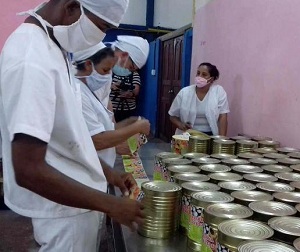 Since the Agricultural Enterprise Group (GAG) affiliated with the Ministry of Agriculture was established five years ago, this entity’s policy has been to prioritize the development of its entire enterprise system, with the creation of agro-industrial companies, to close the production cycle with the highest possible value added to agricultural produce.
Since the Agricultural Enterprise Group (GAG) affiliated with the Ministry of Agriculture was established five years ago, this entity’s policy has been to prioritize the development of its entire enterprise system, with the creation of agro-industrial companies, to close the production cycle with the highest possible value added to agricultural produce.
Leonardo Martínez López, GAG director of Industries and Marketing, commented on the effort in a meeting with the press revisiting the process that gave life to the 200-some processing facilities for fruit and vegetables, grains, meat and other products, existing today in the country.
Of this total, the 120 mini-plants that handle fruit and vegetables processed 1,387 tons of tomato, during the spring season, and work is advancing with mango, pineapple and guava, which began in May and should be completed in September, he reported.
With a processing capacity of 35,000 tons annually, representing 18% of the agro industrial capacity of the entire GAG system, these mini-industries focus on supplying the local market with jam, juice, coconut, guava and grapefruit sweets, dressings, marinades, spices and condiments, among other products.
Based on the management and integration model developed by the Ceballos Agro industrial Enterprise, which includes the large central plant, 21 mini-industries affiliated with agricultural cooperatives, basic enterprise units (UEB), collaboration projects and other partners, positive results have been achieved as the model is extended to other agro industrial poles, Martínez explained.
Martínez pointed out that Ceballos not only has agricultural strength, but is also a powerful industry, in which 21 million dollars have been injected for development. In addition, most of its affiliated mini-processing plants have been certified for safe food handling and good production practices, while the central facility supports them by providing laboratory, branding and marketing services.
This is how, he reiterated, we have been able to make progress, to the extent possible, supporting other important companies, including the Victoria de Girón, in Jagüey Grande, in the province of Matanzas, which has adopted this production model. The intention has been to link large facilities with smaller ones, although the goal has not been fully achieved, due to both objective and subjective factors, he stated.
The objective is to make better use of available capacity, as well as maintenance services, metrology, laboratories and quality/safety certification, the use of brands, and access to all existing markets inside and outside the country.
Another challenge being addressed, Martínez noted, is the acquisition of technologies that allow for the use of the diverse kinds of packaging available, both Cuban made and imported. In the case of small plants, along with the food processing industry, we have widely introduced, for example, the use of glass bottles, he reported.
Despite the many difficulties that persist and the goals that remain to be met, the executive acknowledged that mini-plants are proving their value in the current context, as a fundamental link providing the agro-industrial balance and flexibility needed by all productive systems; since they are capable of processing small quantities of produce that a large plant cannot efficiently assume, and have the workers needed to make the most of raw material when it is available.
(Taken from Granma)